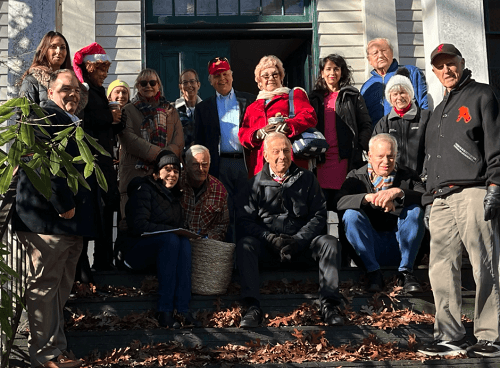News
We Bought the Bethesda Meeting House!

Bethesda, MD January 8, 2024–The Bethesda Historical Society today announced the purchase of the historic Bethesda Meeting House, “the church that named Bethesda.”
A new entity, the Bethesda Meeting House Foundation (BMHF), was formed to take ownership of the property and oversee the restoration and future use of the church and adjacent parsonage that occupy it.
The Meeting House and parsonage sit on a hill overlooking Rockville Pike just north of the National Institutes of Health campus. The first Meeting House on the site was built in 1820 by the Bethesda Presbyterian Church and named after a healing pool in Jerusalem. After fire destroyed the building in 1849, the present Meeting House was constructed, and the parsonage added.
Hank Levine, President of BMHF, noted that “the Meeting House is by far the most important historic building near downtown Bethesda and literally embodies the history of the community.” It served as the town’s first post office in 1852 and was occupied by Confederate cavalry during a July 1864 Civil War skirmish in what is now downtown Bethesda. According to legend, the Church’s bell is linked to Paul Revere and Abraham Lincoln is said to have worshipped or spoken there. The building is notable for its rare “slave gallery,” where enslaved persons were permitted to worship. The Meeting House and parsonage are listed in the National Register of Historic Places and were among the original sites on the 1979 Montgomery County Master Plan for Historic Preservation.
Wendy Kaufman, Secretary-Treasurer of BMHF, noted that “in 1871, the Church’s pastor persuaded a newly appointed local postmaster to petition the Post Office Department to rename the area Bethesda (it was then known as Darcy’s Store). The petition was granted, and the rest is – literally — history.”
The last congregation to occupy the Meeting House, Temple Hill Baptist Church, ceased worshipping there several years ago. The buildings have not been maintained, and extensive restoration work will be necessary. Leading members of the local real estate, legal, and historic preservation communities have volunteered their time and expertise to help BMHF complete the acquisition and plan the buildings’ restoration.
The Foundation is exploring the possibility of partnering with a local nonprofit organization to use the site. “It’s a community treasure,” added BMHF Vice President David Schardt, “and it deserves to be a civic asset.”

